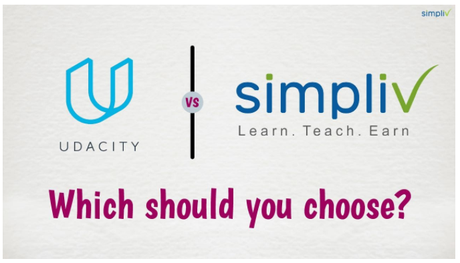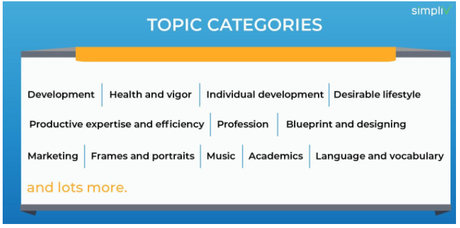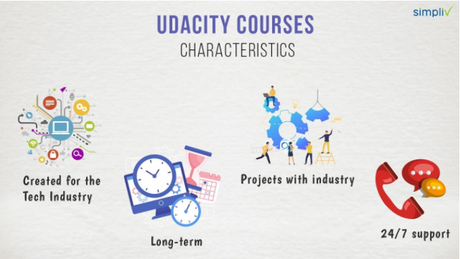So, you have made up your mind to take up an online course, and are mulling over which one to choose. Wondering how I found this out? Simple: the fact that you have chosen to visit this blog. The online learning space is fairly crowded, with players of various sizes tussling out with each other. When it comes to choosing the right platform from which to take up courses, I am sure you would be confused.

To ease this confusion to an extent, in this blog, I will offer you my assessment of two popular online learning platforms, Simpliv and Udacity.
Simpliv v/s Udacity In Comparison
Before we address this question, let me first give you some idea of what and are. Very briefly, they are both formidable players in what is called the Massive Open Online Courses (MOOC) market. As can be understood from the term, these are part of a trend that has been catching up and growing steadily of late: online education.
The association that most of us make the moment we hear the phrase, "online education", is the coronavirus because most of us like to think that it was this pandemic that brought about this form of education. The fact is, online education preceded coronavirus by quite a few years. Only, the outbreak of this pandemic at a global level has drawn the world's attention to this version of education.
So, what is it about makes MOOCs such a popular mode of eLearning for people across the world? We could briefly think of at least a few points:
They are absolutely accessible: The outstanding feature of online learning is that being online, it is flexible to a degree that can never be achieved by traditional, offline learning. It is the equivalent of carrying your classroom with you! If you have chosen eCommerce payments, you will have done so because of the sheer convenience it gives. It is just like carrying your bank account with you.
Online learning is just the same. All that you need is a device and an internet connection, and you are as good as being in a college or school. You can be mountaineering, you could be hiking, or you could be skating. Yet, you are free to pursue your learning without having to be in a classroom at a designated time or its place.
They are completely flexible: There is no rush to complete any course in online learning. You don't have strict deadlines for taking up or completing any course. You could do so at your will, as permitted by your schedule. Moreover, anyone can enroll for any course at any time without having to go through the rigors of passing qualifying/entrance tests.
They are affordable: Online learning comes with many conveniences, and cost is one of them. There is simply no comparison between online and regular classes when it comes to cost. These courses could be had at a fraction of the price of regular degrees.
They have focused: Online learning addresses a very major issue of regular learning: focus. Most online courses are tuned to the exact needs of the learner. This makes it very to-the-point, making any redundant learning unnecessary.
Now, back to the original point of this blog, let us get down to dissecting the two online education platforms in question, namely Simpliv and Udacity to analyze which of these is better and which you should choose. I will analyze these two by describing how they fare in relation to three parameters that really matter to those who want to enroll for online learning:

Simpliv and Udacity USP's
Let us start with Simpliv. Simpliv is a Fremont, CA-based provider of online education. It is a popular choice for people of all age groups and geographical locations, not just with students, from around the world. Simpliv has positioned itself in the market as a provider of online education to people with absolutely no bias towards any of their factors, such as age, gender, geography, or income levels.
Ultimate value for money platform
The last of these is particularly pronounced, as one finds courses that start at under $3, something that is remarkable by any stretch of the imagination. The first and lasting association one makes with Simpliv is the utter ease of their pricing. An overwhelming proportion of their courses are in the under $10 range, and this means that Simpliv has hit this market where it matters the most: the consumer's price.
Not only does this make Simpliv accessible to almost any segment; this pricing reflects its mission of being a provider of online education for all. If a MOOC platform offers courses at this rate, it is a great indication of how seriously they have pursued their mission of offering online education to all segments of the market.

Perhaps the best validation you will find of its ability to offer courses at incredibly low prices is that it is not only some of the throwaway courses that they offer. We have often seen businesses making tall claims that they offer what is the best price in the market. More often than not, these are clever ruses to make you go to them. Once you have hurried to their store, you discover that the "best price" is never for a premium product or a product that you need. They are mostly for items that would otherwise never move an inch from their inventory.
To be fair to Simpliv, it has avoided this kind of gimmick selling. This brings me to an important point many of my readers have asked me about Simpliv: does its low price suggest that it is short of value? Let me answer this question by taking you to one of its courses that I really can say justifies its positioning:
Alt text: Simpliv value for money
It offers A Complete Guide to AWS Certification Exams for can you guess how much? All of $4.99. Now, this is what I call pushing a valuable item to its lowest price range. With offers like this, Simpliv not only justifies its branding; it also pushes the envelope where pricing is concerned.
Note that this is not a run-of-the-mill course. It has real learning value. It is a complete explanation of how you can go ahead with planning Amazon Cloud- Amazon Web Services, if you want to take up one. Over a period of two hours, the learner gets exposed to all the areas of Amazon Cloud- Amazon Web Services, all of which are offered over nine lectures.
And then, it also has this unbelievable offer on a course that is absolutely valuable for those who are going through . Courses such as these are excellent at high rates. Imagine their value when Simpliv charges all of $9.99 on a course which could potentially determine how you are going to handle a distressful situation for the rest of your life.
And, this is not all. On top of all these, Simpliv also has a 20-day moneyback guarantee on most its products. This will ensure that every cent of your spending is well spent with this platform. The point of giving you all these explanations is to merely drive home the point that where VFM is concerned, Simpliv truly scores.
Simpliv offers literally hundreds of courses , which are simply so affordable that you could pay as much money as you would for a couple of coffees, and yet enroll for valuable learning which could take you a long way up in your career path.
Rating: 9.5/10
Choice of authorsAnother core parameter for which you would possibly choose an online platform, obviously, should be the choice of experts. When it comes to this aspect, Simpliv is good enough.
Why do I say this? Because it has taken care to enroll a few well-known names in the field of online teaching for its platform. The thing I should say about Simpliv when it comes to this point is that it is not biased towards authors from only certain parts of the world. These authors are very meticulously picked purely based on their merit.
Who are these authors, and what makes them valuable for the platform? Let me pick a very small, random list of authors from different subjects to give you an idea of how good you may think they are:
T J Walker: T J Walker is the undisputed master of public speaking teaching in the US, something he can easily stake claim to. What else does one call an expert whose clientele includes past presidents, prime ministers, United Nations staff, CEO's, and well, you name it? His client list reads like a veritable who-is-who of different professions and organizations around the world. Having someone of this stature certainly adds a lot of credibility to the courses.
Danny Liu: Where technical courses are concerned, Simpliv's panel of experts is convincing, too. Take for example, Danny Liu, who has designed many of Simpliv's courses on Agile & IT Service Management. Danny brings about 15 years as a technology professional. A Scaled Agile Practitioner, Agile Scrum Certified Product Owner/Scrum Master, and AWS Developer Associate, Danny certainly carries a lot of weight into his candidature when it comes to teaching. With authors such as this, it does both the author and the learners a world of good!
Kevin ODoherty: Kevin ODoherty is a Psychologist, Expert Witness and Forensic Mental Health Specialist, who also practices as a qualified CBT Therapist. With vast experience in his field, Kevin provides training and consultancy on a wide range of mental health topics. What also enhances Kevin's profile is the fact he offers his expertise as an Expert Witness to law firms across the UK and Ireland.
Just this sample is surely enough to convince any learners about the credibility that Simpliv brings into its course standards.
Rating: 9/10Spread of topics
When it comes to the spread of topics, I want to emphasize that I am not really enamored by the number of courses these platforms offer. I go by quality, rather than by quantity. The reason for this is not difficult to guess. What purpose does a platform serve if it offers some 100,000 courses, 95% of which could have zero enrolments? I would any day prefer a platform that offer a hundred useful and valuable courses to one that offers a thousand, of which not more than a tenth would be memorable.
So, where does Simpliv fare in this regard? One look at its website will convince you that Simpliv has not worried about numbers. A collection of some hundred thousand video lessons does not make this a small platform by any stretch of the imagination. It has an impressive number of courses, but where I liked this platform is when it comes to the relevance of the topics.

Alt text: Simpliv topic categories
So, how are its courses organized within each of these sections? Let us talk about just one of them here, to get an idea of this matter. Talking about one of its categories, namely Individual Development, look at what you can choose from:
Well, this list certainly qualifies for a very pertinent and meaningful collection. I am not really seriously worried about how many courses each of these sections could have. I am impressed by the value and relevance of these courses, at which Simpliv again impresses.
Rating: 9/10And now, Udacity...
Now that we have had some idea of what I think about Simpliv, let me move on to my thoughts about Udacity.
Udacity was started, as stated in its website, by two Stanford instructors, Sebastian Thrun and Peter Norvig, who started rather noiselessly with their first online course, "Introduction to Artificial Intelligence". It was open to anyone and was free. This was to set the path for what has now become a bustling, gigantic global company that offers online courses for preparing professionals.
The company has well and truly taken off from its very first course, which saw as many as 160,000 students from over 190 countries enrolling. Many years and trials and errors later, Udacity is today a preferred destination for professionals who want to learn online about honing and improving many aspects of their career.
All the experience and expertise it has acquired over the years of being in the industry as an early starter reflect in one major aspect: in its UI. It is so pleasing and supple that you cannot take your eyes off the website. Scroll down to any of the sections relating to the courses, and the look and feel is enticing, to put it mildly. All the elements and ingredients relating to any course are very well positioned on the website and perfectly utilitarian.
So, let me get straightway to the three parameters:
Value for money
Alt text: Udacity courses characteristicsValue for money is unquestionable were a highly repeatable platform like Udacity is concerned. Udacity is the world's premier platform for technological courses, and its courses completely justify this standing. Its courses are tuned to the exact needs of the industry, albeit only the tech one. So, it is not surprising that it offers very few short-term courses. Most of its courses are spread over many weeks or months, an indication of how well it has understood the needs of the market.

Another feather in this parameter is that its courses are project-based, making the courses perfectly suited for real-life applications. They also give the learner the discipline and ardor needed for completing high-level technical courses. Project-based courses also offer the closest feel of a real classroom. Its other highlight is the support it offers. Any doubt or clarification that any learner may have, Udacity has instant solutions.
Rating: 9.5/10 Choice of authorsThis is another area that has placed Udacity where it is today. Its courses are not necessarily created or taught by individual instructors or authors. Udacity offers courses that are created and imparted by industry experts who design and teach the courses and then go on to monitor the learner's progress in the project.
When Udacity offers this kind of quality as far as its authors (a better term for this platform would be course creators) are concerned, I would have to be holding a personal grudge against this company to give it poor ratings!
Rating: 9.5/10 Spread of topicsSpread of topics has to be on the high ratings for a platform that enjoys an undisputed reputation in the market for having specialized in offering online courses that are technological and aimed at the professional.
Yet, although the learning community around the world knows Udacity for what it is, I would demur at giving it high marks in this one crucial area. The reason: its obsession (call it specialization if you want to, and I will not protest) with technological courses.
This may be Udacity 's USP, its branding and its messaging, but my brief is to make an objective assessment for my readers. I understand and respect the fact that being a platform for technology-oriented courses could be deliberate, well thought out, and conscientious. Although it's standing as a platform for high quality, industry-ready technological courses is undisputed, I step back when I have to give my rating.
Rating: 8.5/10 Quick Links:Conclusion: Simpliv v/s Udacity 2020
After having weighed the two online platforms and the many offerings they have, I would like to share my parting thoughts about this topic.
In making an assessment of what Simpliv has, I have given it high ratings for the core criterion, namely value for money. My reasoning is simple. Udacity is the preferred platform for professionals, but what about people like you and me, who want to learn for learning's sake? Alright, it is great to think of enrolling for a course in Udacity if I want to hone my skills in database management. But what will I look to if I want to gain clarity about some random musical note? Where will I go if I needed to refine my understanding of retail management? It is in this area that Simpliv scores.
This said, its technological courses are no dud. The learner can choose from anything related to technology, even though Simpliv is not a platform purely for learning related to technology.
Udacity has always positioned itself as a platform that will help professionals upskill and grow in their careers. Towards this end, it has done a remarkable job. Its strength is technical courses, and it plays to its strengths very well. There is almost no topic or subtopic that you will not find at Udacity. But the hitch is that it is almost exclusively and purely for technology-related courses.
Agreed, Udacity's hands seem to be so full that it is perhaps not contemplating courses in other subjects, since it is technological learning in which it has established itself. But then, today's consumer looks for more. It is almost like Udacity has created silos for learning, making the unwritten rule that anyone who wants to learn technology is not entitled to learn about anything else.
Where Udacity scores, however, is in its credibility. A company that carries the credentials of such lofty names certainly doesn't need validation from anyone other than its market. Its affiliation and partnership with leading institutions is the best hallmark of its enduring name. This gives them the confidence to design courses for enterprises and cater to their needs better.
Simpliv, on the other hand, being a relative newcomer, offers a range of topics in its courses that helps its learners derive real value for money, by which I mean both in terms of the cost of the courses, and the skills they give to advance in life. Its range and depth of courses is very impressive. Anything you look for, from photography to meditation, and from acting to self-defense, you will find here, all of them at the most reasonable price you could think of.
So, in closing, I would suggest that Udacity should be the choice for anyone who wants to grow in their career, purely so long as it is a technological career that they are in. There is no dearth of the sheer range and depth of the technical topics they have.
Simpliv is for those who want to enhance their learning in any area of their choice, technology included.
Finally, how would I place these two platforms head to head in their Rating? Here goes my verdict: TIE! Note that I have given both these platforms an overall score of 27.5 out of 30.

